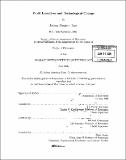Profit incentives and technological change
Author(s)
Linn, Joshua
DownloadFull printable version (8.474Mb)
Other Contributors
Massachusetts Institute of Technology. Dept. of Economics.
Advisor
Daron Acemoglu and Michael Greenstone.
Terms of use
Metadata
Show full item recordAbstract
This thesis is a collection of three empirical essays on the effect of profit incentives on innovation and technology adoption. Chapter 1, written with Daron Acemoglu, investigates the effect of (potential) market size on entry of new drugs and pharmaceutical innovation. Focusing on exogenous changes driven by U.S. demographic trends, we find a large effect of potential market size on the entry of non-generic drugs and new molecular entities. These effects are generally robust to controlling for a variety of supply-side factors and changes in the technology of pharmaceutical research. Chapter 2 investigates the effect of price-induced technology adoption on energy demand in U.S. manufacturing. I use plant data from the Census of Manufactures, 1967-1997, and identify technology adoption by comparing the energy efficiency of entrants and incumbents. I find a statistically significant effect of technological change, though the magnitude is small relative to changes in energy use due to factor substitution. The results suggest that technological change can reduce the long run effect of energy prices on growth, but by significantly less than previous research has suggested. Chapter 3 studies the response of the manufacturing sector to a carbon tax. I estimate long run price elasticities for fuels and electricity, exploiting the ability of entering plants to choose their technology in response to expected prices. A tax of $10 per metric ton of carbon would reduce emissions by 2 percent arid raise operating costs by 8 percent in the short run. Emissions would be 5 percent lower in the long run, and costs would be 5 percent higher. (cont.) The tax would make plants more vulnerable to subsequent natural gas and distillate oil price shocks, and less sensitive to coal, residual and electricity shocks. Exit would increase by 0.2 percentage points.
Description
Thesis (Ph. D.)--Massachusetts Institute of Technology, Dept. of Economics, 2005. "June 2005." Includes bibliographical references.
Date issued
2005Department
Massachusetts Institute of Technology. Department of EconomicsPublisher
Massachusetts Institute of Technology
Keywords
Economics.